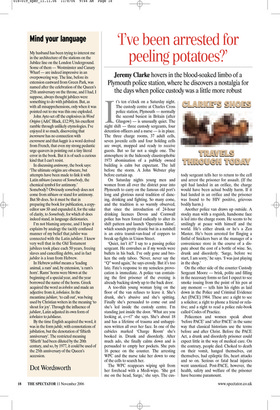Mind your language
My husband has been trying to interest me in the architecture of the stations on the Jubilee line on the London Underground. Some of them — Westminster and Canary Wharf — are indeed impressive in an overpowering way. The line, before its extension eastward from Green Park, was named after the celebration of the Queen’s 25th anniversary on the throne, and I had, I suppose, always thought jubilees were something to do with jubilation. But, as with all misapprehensions, only when it was pointed out to me was this one exploded.
John Ayto set off the explosives in Word Origins (A&C Black, £12.99), his excellent ramble through unlikely etymologies. I’ve enjoyed it so much, discovering that increment has no connection with excrement and that haggis is a word derived from French, that even my strong pedantic urge quavers in pointing out a tiny literal error in the book. But it is of such a curious kind that I can’t resist.
In discussing antimony, the book says: ‘The ultimate origins are obscure, but attempts have been made to link it with Latin stibium (source of Somebody, the chemical symbol for antimony.’ Somebody? Obviously somebody does not come from stibium or stand for antimony. But Sb does. So it must be that in preparing the book for publication, a copyeditor saw Sb and expanded it, for the sake of clarity, to Somebody, for which sb does indeed stand, in language dictionaries.
I’m not blaming anyone, and I hope it explains by analogy the tacitly confused manner of my belief that jubilee was connected with the Latin jubilare. I knew very well that in the Old Testament jubilees took place each 50 years, freeing slaves and cancelling debts, and in fact jubilee is a loan from Hebrew.
In Hebrew yobhel means a ‘leading animal, a ram’ and, by extension, ‘a ram’s horn’. Rams’ horns were blown at the beginning of a special year, and the year borrowed the name of the horns. Greek acquired the word as iobelos and made an adjective from it, iobelaios. In the meantime jubilare, ‘to call out’, was being used by Christian writers in the meaning ‘to shout for joy’. Through the influence of jubilare, Latin adjusted its own form of iobelaios to jubilaeus.
By the time English acquired the word, it was in the form jubile, with connotations of jubilation, but the denotation of ‘fiftieth anniversary’. The restricted meaning ‘fiftieth’ had been diluted by the 20th century, and so, by 1977, it could be used of the 25th anniversary of the Queen’s accession.


































































































 Previous page
Previous page